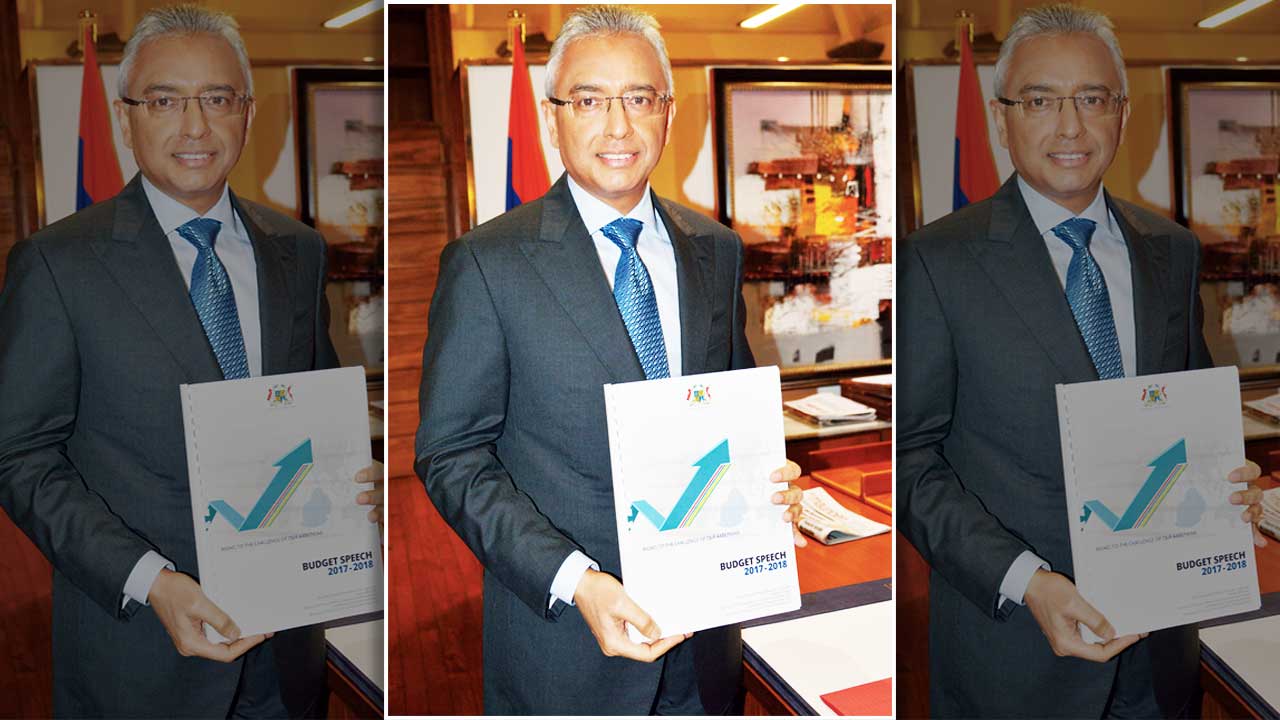
An all-inclusive exercise! This is what a quick glance of the much awaited Budget 2017-2018 reveals. The first Budget of Pravind Jugnauth in his dual role as Prime Minister and Finance Minister is a pack of multi-pronged innovative and bold measures designed to reach all levels of society and all sectors and segments of our economy. But a thorough analysis of the speech makes us realise the daunting task awaiting the government: its efficient and timely implementation. Will the challenge be met?
The title of this year’s budget says it all: We will have to rise to the challenge of our ambitions. While the approach is somewhat different this year, the essence remains similar to past budgets: the same objectives and challenges and predictable contents in a familiar flow. For example, no budgetary exercise is incomplete without the announcement of popular measures for symbolic activities like small planters, breeders and fishermen. This year, tea planters have joined the group.
The Prime Minister, at the very outset, reiterated his ambition as spelt out in the Vision 2030. He expects the economy to register a higher grown rate of 4.1% in the coming financial year. To achieve this, he has to overcome five main challenges: create jobs, invest massively in infrastructure, improve the quality of life of our people, bring about a new social paradigm and lastly, consolidate our macro-economic fundamentals. Ambitions are indeed high, given the aim of making Mauritius a high income country by 2023, with an income per capita of around USD 13,600 against the current level of USD 9,740. This year’s Budget is akin to a three-year strategic plan, which coincides with the remaining term of the present mandate.
Overall, the Budget is much likely to rekindle business and consumer confidence in the economy, with appropriate measures touching each and every sector. In particular, the Budget has a strong dose of incentives to tackle poverty, especially with income support and social housing projects. The business community will also benefit from major tax incentives, especially SMEs, and innovation will be better rewarded.
However, it is must be pointed out that there is no consistency in some measures, and this is likely to frustrate investors. For example, when the Mauritius Diaspora Scheme was launched in 2015, it was clear that the Diaspora member was exempted from income tax on all his income, derived from within or outside Mauritius. Today, the Budget says that the exemption will apply only to the income he derives from the specific employment, business, trade, profession or investment for which he has become registered under the Scheme. Such a change in policy barely two years into the scheme is not investor-friendly.
Another issue is the recurrent recourse to discriminating policies by successive governments. For example, writing-off of loans for specific trades is not conducive to a healthy business environment when other small entrepreneurs are excluded.
It is interesting to note that, following recent controversies on the high salaries and perks paid to government advisers and nominees, the Finance Minister has introduced a Solidarity levy of 5 percent on those earning more than Rs 3.5 million annually. On the other hand, about 150,000 low income earners earning up to Rs 10,000 monthly will benefit from a ‘negative income tax system’ whereby their income will be topped up.
Major infrastructural developments have again been announced, and most will be financed out of the grant of 500 million USD from India. Some of the projects announced had either been announced before or are ongoing. Two sectors with vast projects in the pipeline are energy and water. The measures demonstrate that the government is working seriously towards achieving the promise of water supply on a 24 hour basis. On the energy sector, the focus is on renewable energy, mainly solar power, and incentives have been given to encourage householders and small businesses to produce solar energy. However, it is a bit odd that a humid region like Henrietta has been chosen to set up the CEB’s solar farm of 2 MW.
The government is moving further in its cost-cutting drive to reduce inefficiency by emulating the Landscope experience. Thus, a new single agency, SME Mauritius will cater for the SME sector, while a new Economic Development Board will see the merger of the Board of Investment, Enterprise Mauritius, the Financial Services Promotion Agency and the Mauritius Africa Fund.
Biotechnology, innovative fields and research and development are also high on the agenda. Furthermore, Business Facilitation moves several steps further with the streamlining of procedures and abolition of major requirements. Rodrigues and Agalega are not forgotten, with massive investment planned in these islands.
As is the case every year, any Budget is judged upon its successful implementation, and the Budget 2017-2018 is no exception. Will this ambitious budget succeed in rekindling the feel good factor in the country that has been dwindling so far? Time will tell…
 J'aime
J'aime














